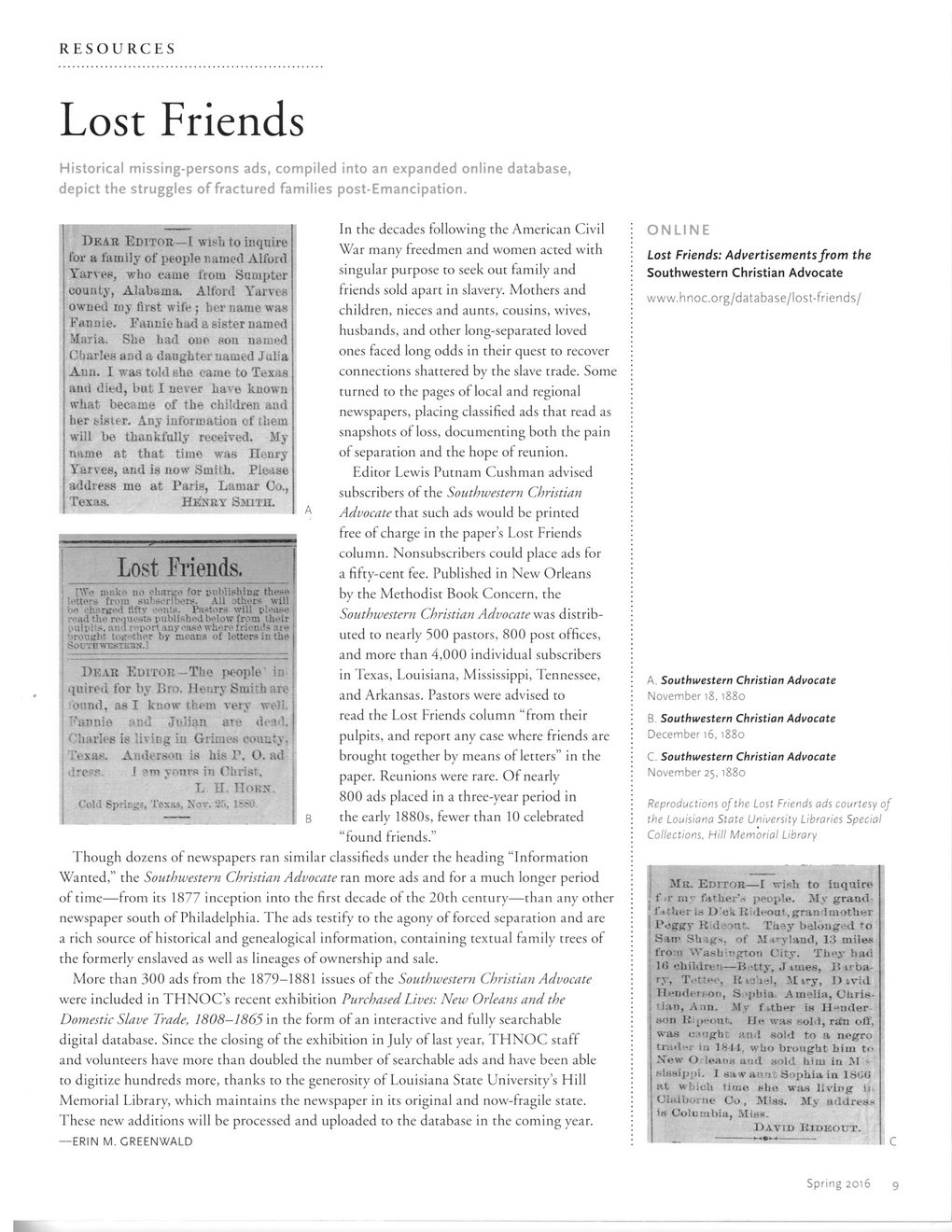This text was obtained via automated optical character recognition.
It has not been edited and may therefore contain several errors.
RESOURCES
Lost Friends
Historical missing-persons ads, compiled into an expanded online database, depict the struggles of fractured families post-Emancipation.
In the decades following the American Civil War many freedmen and women acted with singular purpose to seek out family and friends sold apart in slavery. Mothers and children, nieces and aunts, cousins, wives, husbands, and other long-separated loved ones faced long odds in their quest to recover connections shattered by the slave trade. Some turned to the pages of local and regional newspapers, placing classified ads that read as snapshots of loss, documenting both the pain of separation and the hope of reunion.
Editor Lewis Putnam Cushman advised subscribers of the Southwestern Christian Advocate that such ads would be printed free of charge in the paper’s Lost Friends column. Nonsubscribers could place ads for a fifty-cent fee. Published in New Orleans by the Methodist Book Concern, the Southwestern Christian Advocate was distributed to nearly 500 pastors, 800 post offices, and more than 4,000 individual subscribers in Texas, Louisiana, Mississippi, Tennessee, and Arkansas. Pastors were advised to read the Lost Friends column “from their pulpits, and report any case where friends are brought together by means of letters” in the paper. Reunions were rare. Of nearly 800 ads placed in a three-year period in the early 1880s, fewer than 10 celebrated “found friends.”
Though dozens of newspapers ran similar classifieds under the heading “Information Wanted,” the Southwestern Christian Advocate ran more ads and for a much longer period of time—from its 1877 inception into the first decade of the 20th century—than any other newspaper south of Philadelphia. The ads testify to the agony of forced separation and are a rich source of historical and genealogical information, containing textual family trees of the formerly enslaved as well as lineages of ownership and sale.
More than 300 ads from the 1879—1881 issues of the Southwestern Christian Advocate were included in THNOC’s recent exhibition Purchased Lives: New Orleans and the Domestic Slave Trade, 1808—1865 in the form of an interactive and fully searchable digital database. Since the closing of the exhibition in July of last year, THNOC staff and volunteers have more than doubled the number of searchable ads and have been able to digitize hundreds more, thanks to the generosity of Louisiana State University’s Hill Memorial Library, which maintains the newspaper in its original and now-fragile state. These new additions will be processed and uploaded to the database in the coming year. —ERIN M. GREENWALD
I)kae Editor—I wish to inquire for a family of people named Alford Yarves, who came from Sumpter county, Alabama. Alford Yarves owned rn\ first wife j her name was Fannie. Fannie had a sister named Maiia. She had one sou nami-il Charles and a daughter named J ulia Aun. 1 was told she came to Texas ami died, but I never have known what became of the children and her winter. Any information of them will be thankfully received. My name at that time was Ileury Yarves, and is now Smith. Please address me at Paris, Lamar Oo., Texas. Hknuy Smith.
Lost Friends.
---- -----------------------------------
[YTi» nmko no ch.irno for publishing1 fheso Vttt'r© from sub^oribors. Ali jthors will n,\ .‘hnr£<M rifty Fiwtors will •,
:-*-adtho roauosis publWuKibolow from thoir • .'iiU'Ps, :mu report ;my wli^ro frioii^s are j ■•routfto to^-'thor by moans of letters in the
SOUTF-VfKSTKBN.) I
]>EAK Editok —The people in i .[iiirod for by Bro. Henry Smith are ■ omul, as I know them very v,e)i. ''iiiinie and Jvlian are den-!. Charles is living in Grimes couuty. Texas. Aixfrnson is his 1’. O. ad ,‘rc^P 1 yours in ('iirisr,
L U. Hokx. |
Cold Springs, Texas, Nov. 1~.~0 i
----- j B
ONLINE
Lost Friends: Advertisements from the Southwestern Christian Advocate
www.hnoc.org/database/lost-friends/
A. Southwestern Christian Advocate
November iS, 1880
B. Southwestern Christian Advocate
December 16,1880
C. Southwestern Christian Advocate
November 25,1880
Reproductions of the Lost Friends ads courtesy of the Louisiana State University Libraries Special Collections, Hill Memorial Library
1 JIk. Editor—I wish to inquire j I' .r m” fa •■her'.' people. -My grand fither is J)c!i Rideout, grandmother I IV'ggy Rd-eon*. Tuey belonged fo Sair Sli ig->. of .M-nyland, 13 miles fro-n Washington City. They had 10 children—H.-tty, J imes, I! irba-ry, T.-tre.', R le'i-il, M try, J) ivid lleiideiioii, S *[>bia. Amelia, (JUrim-'ian, A,111. Mv f i,tber iw Hinder won Rpeout. lie was koM, Tiin oil’, was e Mifjhi, and sold to a negro tr:id-*r in 1811. who brought him te Xew O leans a>id wold him in M -- mnHip;>i. I suv aiw; Sophia ill at which lime nlie was living jj. Claiborne Oo, Miss. My address is Columbia, Miew.
David Rideout.
Spring 2016 9

New Orleans Quarterly 2016 Spring (09)
